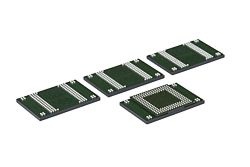 Intel has introduced a new solid state drive, the Z-P140, which they plan to market as part of their Menlow mobile platform. A press release describes the drive as "smaller than a penny and weighing less than a drop of water." It will initially be available in 2GB and 4GB capacities, with a maximum capacity for the line of 16GB. It uses a Parallel ATA (PATA) interface.
Intel has introduced a new solid state drive, the Z-P140, which they plan to market as part of their Menlow mobile platform. A press release describes the drive as "smaller than a penny and weighing less than a drop of water." It will initially be available in 2GB and 4GB capacities, with a maximum capacity for the line of 16GB. It uses a Parallel ATA (PATA) interface.
As mobile devices from media players to smartphones become more common there's a growing market for smaller, lighter, more durable storage that consumes less power. Solid state drives accomplish all these things by using memory technology to eliminate motors and other moving parts.
"Our mission is to provide world-class non-volatile SSD and caching solutions that are designed, optimized and validated to enhance Intel Architecture-based computing platforms," said Pete Hazen, director of marketing for Intel's NAND Products Group. "Our customers are finding the Intel Z-P140 PATA SSD to be the right size, fit and performance for their pocketable designs. This is Intel's latest offering as we continue to expand our product line of reliable, feature-rich and high-performing SSDs."
The Z-P140 joins Intel's Z-U130, which uses a USB interface and is found in a variety of server, desktop, and laptop hardware. Next year the company also plans to introduce a Serial ATA (SATA) model.
Source: Press Release
"Our mission is to provide world-class non-volatile SSD and caching solutions that are designed, optimized and validated to enhance Intel Architecture-based computing platforms," said Pete Hazen, director of marketing for Intel's NAND Products Group. "Our customers are finding the Intel Z-P140 PATA SSD to be the right size, fit and performance for their pocketable designs. This is Intel's latest offering as we continue to expand our product line of reliable, feature-rich and high-performing SSDs."
The Z-P140 joins Intel's Z-U130, which uses a USB interface and is found in a variety of server, desktop, and laptop hardware. Next year the company also plans to introduce a Serial ATA (SATA) model.
Source: Press Release












